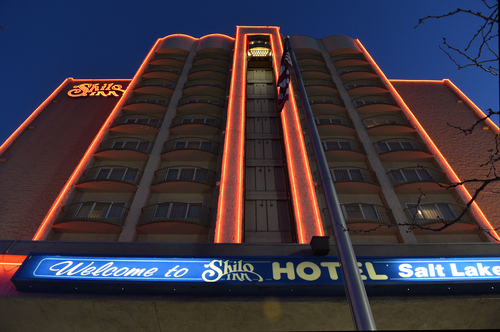This is an archived article that was published on sltrib.com in 2014, and information in the article may be outdated. It is provided only for personal research purposes and may not be reprinted.
Downtown Salt Lake City's iconic Shilo Inn has been sold and its new Cedar City-based owners are promising to renovate the aging hotel and relaunch it as a Holiday Inn.
The neon-lined hotel, at 206 S. West Temple next to the Salt Palace Convention Center, will see a major overhaul of its 200 guest rooms, lobby and common areas as well as its exterior, said Jim Burgess, president of the privately held Burgess Investment Group, which bought the site late last week.
The Shilo Inn will get a complete facelift — including removal of its glaring red neon features.
"It'll look like a new hotel when it's done," Jim Burgess said. "The goal is for no-one to know it's a conversion."
Built four decades ago, the hotel is remembered by many longtime residents as the scene of a horrific murder-suicide in the late 1970s. It has operated under several names, most recently as a Shilo Inn in the mid-priced range of Salt Lake's lodging market. The Portland-based Shilo Inns chain last remodeled the hotel's rooms, banquet and meeting facilities and Luke's Cafe restaurant in 1994.
The family-owned Burgess Investment Group plans to invest up to $10 million in overhauling the hotel, its president said. The 12-floor facility hotel will continue to operate as a Shilo Inn through the revamp, then re-open as a Holiday Inn Express when work is done about eight months from now.
Burgess declined to specify a purchase price for the property, but said it will be worth between $25 million and $30 million when the renovation was complete. County records put the 2013 assessed value of the building and land at $6 million.
Created by plumber-turned-developer and former Cedar City Mayor Joe Burgess and now run by his three sons and a son-in-law, Burgess Investment owns 21 hotels across Utah, Idaho, Nevada and Texas. It has operations in real estate, construction, development and property management as well as hotels, with $50 million in annual company revenues and 500 employees, the younger Burgess said.
Since 2006, the group has specialized in building or purchasing existing hotel properties and improving them, then securing franchise deals with major hotel chains, including Marriott, Hilton and Holiday Inn's parent company, Intercontinental Hotels Group.
With its proximity to the Salt Palace, City Creek Center, EnergySolutions Arena and the rest of downtown, the 1.51-acre Shilo Inn site is strategically located for Utah conventioneers, business travelers and year-round tourists.
"This is a great opportunity for us to get into a high-end urban market," Burgess said.
The spot gives Holiday Inn its first location in the center of Utah's largest city, though the chain operates two hotels near Salt Lake International Airport, one an express hotel and the other full-service. It also positions the chain for more business from frequent travelers loyal to its world-known rewards program who also want downtown accommodations.
An Atlanta-based media relations specialist for Intercontinental Hotels Group did not return calls seeking comment. Calls to the 35-hotel Shilo Inns chain's corporate offices in Portland, Ore., went unanswered.
For its part, Burgess Investment has expanded its hotel holdings from a lone Comfort Inn in Cedar City to its current portfolio by buying or building an average of between two and five hotels per year since real estate markets crashed. Its holdings include the Hampton Inn on 45th South in Murray, several hotels in Cedar City and St. George and the former Falcon Ridge Hotel in Mesquite, Nev., which it bought and also converted to a Holiday Inn Express.
The group currently has a hotel under construction in Pahrump, Nev., west of Las Vegas.
Recognizable on the Salt Lake skyline by its ruby glow, the Shilo Inn also pops up on lists of haunted hotels, in connection with an August 1978 incident involving a woman named Rachel David and her family.
David and seven children rented a top-floor room in what was then called the International Dunes Hotel, three days after her husband Immanuel David, apparently a religious zealot, committed suicide by carbon-monoxide poisoning. On the morning of Aug. 3, 1978, the 38-year-old mother coaxed her three oldest children to jump from an upper balcony to their deaths and then threw the others off against their will as witnesses below watched, before she, too, jumped.
One daughter survived, though she was severely disabled.
Twitter: @Tony_Semerad



